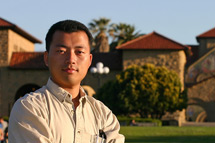
Handy Links
SLAC News Center
SLAC Today
- Subscribe
- Archives: Feb 2006-May 20, 2011
- Archives: May 23, 2011 and later
- Submit Feedback or Story Ideas
- About SLAC Today
SLAC News
Lab News
- Interactions
- Lightsources.org
- ILC NewsLine
- Int'l Science Grid This Week
- Fermilab Today
- Berkeley Lab News
- @brookhaven TODAY
- DOE Pulse
- CERN Courier
- DESY inForm
- US / LHC
SLAC Links
- Emergency
- Safety
- Policy Repository
- Site Entry Form

- Site Maps
- M & O Review
- Computing Status & Calendar
- SLAC Colloquium
- SLACspeak
- SLACspace
- SLAC Logo
- Café Menu
- Flea Market
- Web E-mail
- Marguerite Shuttle
- Discount Commuter Passes
-
Award Reporting Form
- SPIRES
- SciDoc
- Activity Groups
- Library
Stanford
Around the Bay
Yulin Chen to Receive Spicer Young Investigator Award
Physicist Yulin Chen of the Stanford Institute for Materials and Energy Science has been awarded the 2009 William and Diane Spicer Young Investigator Award. The award, named for Stanford professor and SLAC researcher William Spicer (1929–2004), and his wife Diane, who passed away in 2009, is given to an early career researcher whose work has benefited from or is beneficial to the Stanford Synchrotron Radiation Lightsource or the overall lightsource community.
"I am very glad that our work was acknowledged," Chen said of the award. "I feel very excited not only because of the prize itself, but also because we could demonstrate the great opportunity SSRL provides for science. I hope the lab will keep developing its remarkable capabilities for experiments and become an even better platform for more exciting science to be carried out."
The award will be presented at the October 19 SSRL/Linac Coherent Light Source Annual Users' Meeting at SLAC. The award includes a certificate and monetary gift of $1,000. In turn, Chen will give a short presentation describing his work.
Together with other theoretical and experimental physicists at SIMES, a joint collaboration between SLAC and Stanford University, Chen helped find bismuth telluride—an example of a new class of materials called topological insulators—which was originally predicted by theory in 2007. The experimental discovery has potential impact for future research in not only fundamental physics, but also semiconductor and energy science.
Topological insulators create a unique atmosphere for electrons, in which the electron spin and momentum are "locked" to each other on the surface of the material. This enables electrons to flow around non-magnetic impurities, instead of being scattered backward. This allows current to flow without loss of energy. Also, because electron spin and momentum are coupled, electron spin could be manipulated by an electric current applied across the surface of the topological insulator.
Physicists may use bismuth telluride to study the physics of relativity in a condensed matter system or to realize elusive particles such as magnetic monopoles or majorana fermions.
Chen's research indicated that bismuth telluride could be used at much higher temperatures than theory predicted, bringing this substance much closer to real applications. A topological insulator such as bismuth telluride could one day be used to make smaller transistors for use in more compact electronics that consume less energy. The material could also be used in novel spintronic devices without bulky magnets such as the read/write head in current hard drives. Being great thermoelectric material, bismuth telluride could even convert temperature gradients across itself to electricity or vice versa, for possible use in recycling waste heat into clean electricity or refrigeration without greenhouse coolant or cryogens.
"We study fundamental physics, but we also want to contribute to people's lives," Chen said.
—Lauren Knoche
SLAC Today, September 10, 2009
